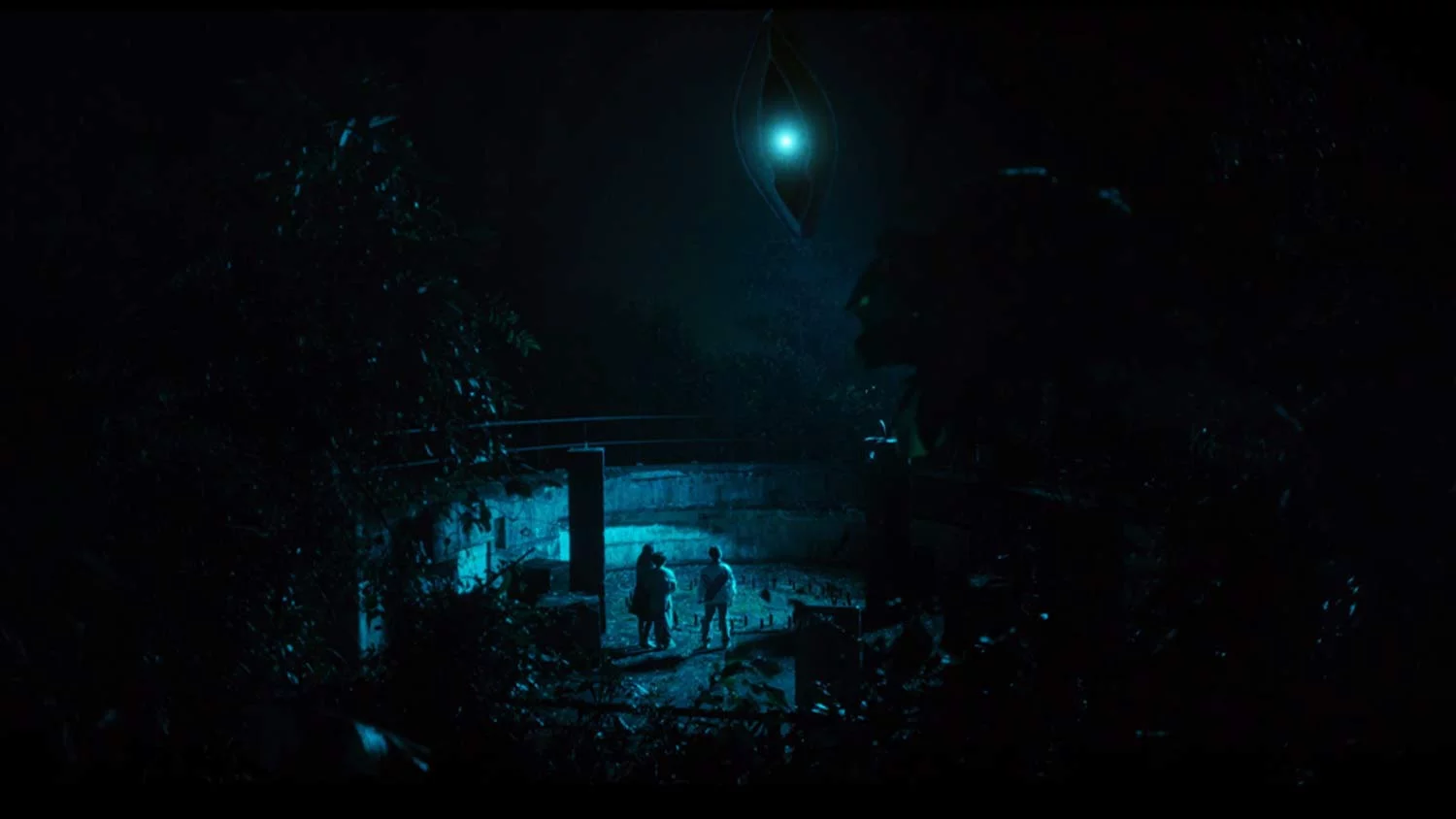Affectless Cinema
By Edisa Yeo

There are a few ways that a person may suddenly develop an over-keen awareness of how absurd living really is. While this disruptive thought can usually be pushed aside so as not to obstruct our view on life, three short films this year – Nothing in the Cries of Cicadas, New Abnormal and A Man Trembles – are steeped in its dangerous and dreadful contemplation. More interestingly, the films also propose the same point of origin for this crisis of meaning: a paternal government whose total power blunts any sense of autonomy that its national subjects might possess.
In response to their unjust existence, the characters display a strange moodlessness. Their mute civility amidst their oppressive circumstances achieves the opposite effect of assimilation, as they only become further separated from reality. They look out at their lives and into the audience with an affectless gaze that is ultimately deeply affecting.

As it turns out, this non-committal gaze is the perfect defiance of meaning itself. As our searching eyes are met with their empty glares, we are able to see that the life they lead is as unintelligible as the emotion in the shot is for us.
In Nothing in the Cries of Cicadas, the protagonist, an unnamed middle-aged Chinese man, resolves to visit a loved one’s grave for one last time before it is exhumed according to a land redevelopment policy by the Singapore government. As he takes a long drive to the unpopulated periphery of the city and slowly ambles across the large arid cemetery, the atmosphere in the film also begins to feel suffocatingly dry – barren of discernible meaning. He watches listlessly as migrant workers, of a race and culture different from his, demolish the tomb into brick, until it is finally rubble.

We do not know if he is a religious man but still, we feel a deep loss of dignity on his end because even as the ground beneath him literally upends, he can only stand by and relent to the bulldoze of policy. His stoicism, while short of mournfulness, carries with it an unspecifiable melancholy.
In fact, he never speaks, even once. The film, strikingly, has no dialogue. The only words we ever hear are from a disembodied government source – a news reporter who announces the land redevelopment policy on the local radio. Everyone else is voiceless. Everyone else has to lug their body around, burdened by the degrading fact that it will never be buried.
Because there is no interlocution, it is only at the halfway mark of the film, when the camera pans tentatively over the protagonist’s shoulder as he sleeps, that we suspect he is being accompanied by someone. On this note, the filmmaker, Chiang Wei Liang, indicates that the film is actually from his point-of-view and that the protagonist is his own real-life father. But even without this clarification, the camera hangs in such a way that we are able to recognise the perspective of a cautious child who tails behind a father as he leads familial rituals.

With this realisation, the suffocating silence in the film suddenly intersects with our expectation of stern father tropes in Asian households. We begin to understand why his actions and emotions thus far are so opaque to us. We even accept it as a show of strength, his insistence on witnessing every detail of the desecration being a self-inflicted suffering.
Sadly, the film ends before catharsis is achieved for anyone. In the end, everything remains uncommunicable between father and son. Staid and patient, the film is an exercise in observance. It shows exactly how the demolition of historical sites leads to the loss of context for one man and since he is unable to articulate his loss to his son, the loss of heritage forever.
In New Abnormal, the characters seem to be afflicted by the same drowsiness we see in Nothing in the Cries of Cicadas. The film caricatures Thai society during the pandemic and each scene acts as a capsule exploring various aspects of this outlandish world. Cumulatively, they mirror the fragmentation and isolation of mass quarantine. Its protest imagery, instead of rallying us, is portrayed from such a static and cynical perspective that it almost immobilises us.
The characters lambast their government and articulate their grievances directly to the camera, yet their tirades are tonally dead. If the affectless gaze in Nothing in the Cries of Cicadas was a demonstration of obstinance, this expressionlessness in New Abnormal is an outright affront to the state. More than just a refusal to expend anger, it is a controlled presentation of their suffering as pure, inviolable fact.

New Abnormal also takes a sideways look at how Thai protesters have borrowed from popular culture to theme their protests – a surreal phenomenon of life imitating art. In real life, they dress up effigies as Lord Voldemort, drawing similarities between the Harry Potter villain with the Heads of State in the country. The film directly responds with a scene of Voldemort relaxing in a bubble bath, still pristine and untouched. In another scene, an impersonator of Thailand’s Prime Minister Prayut Chan-o-cha acts out an imagined scenario of his office behind closed doors. Trifling and unqualified, he passes a new policy on a whim and then spends the rest of his time online shopping. A grim perspective of authoritarian frivolity emerges.
In the face of brute political power, human constructs of meaning and attempts to relate to each other completely collapse. The incorporation of fiction into real life only highlights the latter’s absurd and artificial nature. The film even seems to criticise the inauthenticity of co-opting these foreign symbols for a national movement. It introduces a recurrent motif of plastic disposables that has become interwoven into Thai culture – rubber duck floats to shield against police water guns, bubble tea straws and cups, and at one point, it even floods the screen with plastic bags flying in from behind the camera.

In New Abnormal, it seems that there is no sensible response to a situation where your planet, your nation and your society suddenly becomes unsuitable for living. This abject homelessness advances toward its inevitable conclusion – suicide – in A Man Trembles.
In A Man Trembles, a family suffering from economic hardship because of the Asian Financial Crisis (AFC) decides to leave their worldly concerns behind them. They wait for the arrival of an alien mothership to remove them from Earth. Its premise parallels the tragic phenomenon in the actual aftermath of the AFC where people were taking their lives because they could no longer bear the burden of crushing debt.
In Nothing in the Cries of Cicadas and New Abnormal, the disenfranchised characters find themselves languishing in their stupor, but the family in A Man Trembles become galvanised by the closeness of death. The film suggests that the only true release we may achieve from the oppressiveness of living must be a spiritual one, because as the Mother affirms, “God also know, we not for this world”. In contrast to the consumerist escapism that the characters seek in New Abnormal, the film repudiates such material solutions to an existential problem.
The film is also unabashedly gendered. The UFO which the family encounters is shaped in the form of a vagina, signifying a return to the womb from which we have been helplessly ejected. The mother also reminds the family of their Catholic faith, making sure her son has his rosary and that they should not be unshaken because God is with them, the absolute embodiment of the spiritual.

Contrarily, the father is a representation of the material world that is separated from salvation. In a scene that bears striking similarities to one in Moonlight by Barry Jenkins, the father holds his son up in the water. While the scene in Moonlight submerges the audience in the dynamically-moving waves and represents a profound baptism of manhood for its protagonist, the water here is stagnant. The father looks into the camera with a glazed expression, completely cut off from the metaphysical potential of the water around him.


On the morning of the planned abduction, he goes back into the hotel room for cash “just in case”, even as he knows that they will no longer have any use for it. In the end, the fact that he flees from the unknown and abandons his family is an adroit metaphor for the unreliability and illusory trustworthiness of paternalistic financial institutions.
More than just the filmmaker’s practical defence against effusiveness, the affectless gaze in cinema can embody many things – the final reserve of power for an oppressed individual, wilful defiance against a surveillant government or simply, a profoundly disengaged human being.